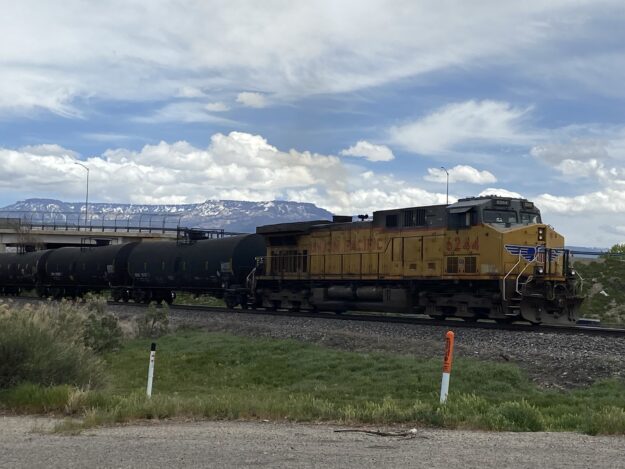Widgetized Section
Go to Admin » Appearance » Widgets » and move Gabfire Widget: Social into that MastheadOverlay zone
Boebert opponents in Colorado vow to keep battling Utah’s Uinta Basin Railway

Candidates from both major political parties looking to unseat pro-fossil-fuel and national rising-star Republican U.S. Rep. Lauren Boebert agree Utah’s Uinta Basin Railway that would dramatically increase oil-train traffic through Colorado is a bad idea, with one GOP challenger saying he’d go to extremes to stop the proposed Utah rail project.
“I almost think of Tiananmen Square with that,” Carbondale Republican Russ Andrews said in a recent phone interview, referring to a pro-democracy demonstrator standing in front of a tank during a deadly military massacre in Beijing in 1989. “I’m thinking I would stand in front of the train tracks, I mean, on the train tracks in front of the train.”
The proposed 88-mile Uinta Basin Railway would connect drilling operations in northeast Utah to the main rail line near Price, sending up to five two-mile-long oil trains a day along the Colorado River and through Denver toward Gulf Coast refineries, increasing production by up to 350,000 barrels a day. Legal action by environmental groups and Eagle County, including nearly $450,000 in taxpayer-funded legal feels, has delayed if not outright derailed the project.
Andrews, a former engineer who says he went to State University of New York Maritime College to study the design and operation of mobile and stationary power plants, as well as the transportation of toxic materials, made it clear he does not oppose oil and gas drilling overall.
“I am an engineer. I’m a conservative,” said Andrews, who’s now a financial adviser and radio commentator in Carbondale, near Aspen. “I am not opposed to fossil fuels in any way, shape or form. I am opposed to having 30,000-gallon tanker cars, 500 of them a day, transiting across or around the water source for 40 million Americans, which is the Colorado River.”

That sentiment is echoed by Grand Junction Mayor Anna Stout, a Democrat who’s seeking the nomination to take on Boebert in next year’s election for the massive 3rd Congressional District that borders Utah and includes most of Colorado’s rural and energy-rich Western Slope.
“So whether [the Utah oil is] coming through on trains or whether it’s coming through on trucks … 40 million people rely on the Colorado River, and if we had a derailment like what happened in Pueblo along the Colorado River, it would be disastrous,” Stout said in a phone interview, referring to a fatal train derailment near Pueblo, Colo., in October.
The working-class cities of Grand Junction and Pueblo, which is in southern Colorado, are the two largest population centers in the district.
“Until we invest in the infrastructure needed to ensure that our rail lines are safe, and that they are up to current standards, we should be very careful about what we’re sending along any of our train tracks or our rail lines,” Stout added, referring to bipartisan rail-safety legislation that has been languishing in Congress since last summer’s catastrophic East Palestine derailment in Ohio.

“Regarding the train story, there’s no comment at this time regarding it,” Boebert spokesman Anthony Fakhoury wrote in an email. “We’re still awaiting more information and developments into the situation before we take a hard stance on it.” But, he added that Colorado ranks fifth in the nation for oil and gas production and Boebert “has always been a strong advocate for American energy production and considers protecting the thousands of energy jobs in her district a top priority.”
Adam Frisch, an Aspen Democrat who lost to Boebert by just 546 votes in 2022 and is running again in 2024, is a proponent of increased domestic oil and gas production despite its current all-time record levels, arguing it’s produced in the United States under stricter environmental regulations than in other countries, but he said the Uinta Basin Railway is problematic because of where the oil trains have to go on their way to Gulf Coast refineries.

“I realize that some people are against this rail because they just don’t want anything to do with energy being produced in the United States. And you have some really, really important water that is responsible for 40 million people in the country,” Frisch said of the Colorado River in a recent phone interview. “And I fully appreciate that, God forbid, there’s an accident, it’s better that it’s this waxy, quasi-solid than liquid oil. But that still doesn’t calm down a lot of people, and rightly so, about it. I need to look at the maps and I’m not the one that should be doing it sitting in Congress in 2025, but is there not any other path … to figure out how to move [the oil] from where the energy is produced to where it needs to go to?”
Andrews said the Uinta Basin waxy crude, which is too thick for pipelines and must be heated in transit, can’t just be scooped out of a waterway if it spills.
“You can’t [just scoop it up] because what’ll happen is the molecules will slough off all day every day, 24-7-365, until you get it out of there, and getting it out of there, the candle wax will slough off, thousands of pounds of this stuff as it goes all the way out to California,” Andrews said. “When that oil hits that cold water, it will congeal and sink to the bottom, and it will take billions of dollars and years to mitigate that. It would be a disaster, an unmitigated disaster.”
Again, Andrews emphasizes he’s not opposed to fossil fuels, and is in fact is a signatory of the Oregon Petition, “which essentially states that the anthropogenic cause of global warming is not an existential threat to the planet.” But he’s vehemently opposed to the Uinta Basin Railway and any Plan B methods of increasing oil-train traffic through Colorado.
Those methods include the proposed expansion of the Wildcat Loadout on U.S. Bureau of Land Management land near Price, which proponents want to see fast-tracked to accommodate a huge surge in truck traffic from the Uinta Basin, through tribal lands and petroglyph-rich areas such as Ninemile Canyon. The BLM is weighing what type of environmental review to conduct despite recent revelations of ongoing Utah Division of Air Quality violations.
Utah’s entire congressional delegation supports the Uinta Basin Railway project, with Utah U.S. Sen. Mike Lee particularly outspoken against what he called the “woke environmentalism” of Colorado’s opposition to the proposal, which he said “undermines the integrity of our regulatory process and stifles innovation. I will continue working with my Senate colleagues, our state’s leaders, and all relevant agencies to ensure this project moves forward promptly.”
Frisch said he is sympathetic to the Ute Indian Tribe of the Uintah and Ouray Reservation in northeastern Utah, which is a big backer of the Uinta Basin Railway project and deeply disturbed by Colorado lawmakers looking to block the railway, since tribe members say they were forced out of Colorado to their current location and have a right to profit from the oil in Utah.
“Then you have the tribes who are really supportive of it and are raising some frustrations that they don’t feel like they’re being heard. One, I was born on the Indian reservation in northeastern Montana, and so I learned a little …,” Frisch said. “Two, I’m a big believer that the tribal lands need this. There’s a sovereignty conversation, which I respect, with sincerity, and they deserve with sincerity and authenticity, a sincere seat at the table.”
All three CD3 candidates interviewed for this story said Interstate 70 from Denver into the mountains is a nightmare that needs to be fixed, and they blame Boebert for not focusing enough on infrastructure issues while she fights culture wars in Washington.
Frisch said when he graduated from the University of Boulder in 1990, he remembers I-70 being far fewer lanes and argues that despite some improvements it’s still inadequate given the state’s huge surge in population since then. He says passenger rail is one way to take pressure off I-70.
“I’m a big proponent of rail because I still think it is environmentally and economically sound way to move transport around,” Frisch said. “I was up in Craig [recently], and there’s a lot of interest for passenger rail as well, and I do believe increased passenger rail is good for tourism, I think it’s good for economics, and it’s a good way to move people around.”
Frisch said Boebert is focused on all the wrong things in Congress: “There’s just a lot of time and money being spent on reducing the Secretary of Defense’s salary to a dollar or impeaching this person or impeaching that person when we should be focusing on how do we make sure that we have an energy infrastructure for 2023 and beyond.”
Grand Junction’s Stout, also a proponent of increased passenger rail, points to the stalled rail safety bill and lack of infrastructure spending overall for what she dubs “geographic inequity” in the district – a factor she says makes it difficult move west to east: “We really have not invested significantly in our transportation infrastructure in this country in many decades. We’re feeling the pinch over here in Western Colorado because of it, and in southern Colorado as well.”
Andrews also calls increased passenger rail a good idea and vows to focus on bringing federal dollars back into the district if elected.
“One of the primary reasons I’m running is that Lauren Boebert, she went to D.C. for God knows what reasons, but whatever the reasons were, none of them really had to do with representing the district,” Andrews said. “Last year, she brought 1.1 billion fewer dollars back to the district than the average district in the state enjoyed, and that works out to $5,800 per family of four – [money] that CDOT [the Colorado Department of Transportation] didn’t have to build more roads, to improve bridges, that we didn’t have to improve or increase rail lines. So that’s actually the very first reason that I’m running is to do a better job representing the district.”
Editor’s note: A version of this story first appeared in the Park Record newspaper in Park City, Utah.


